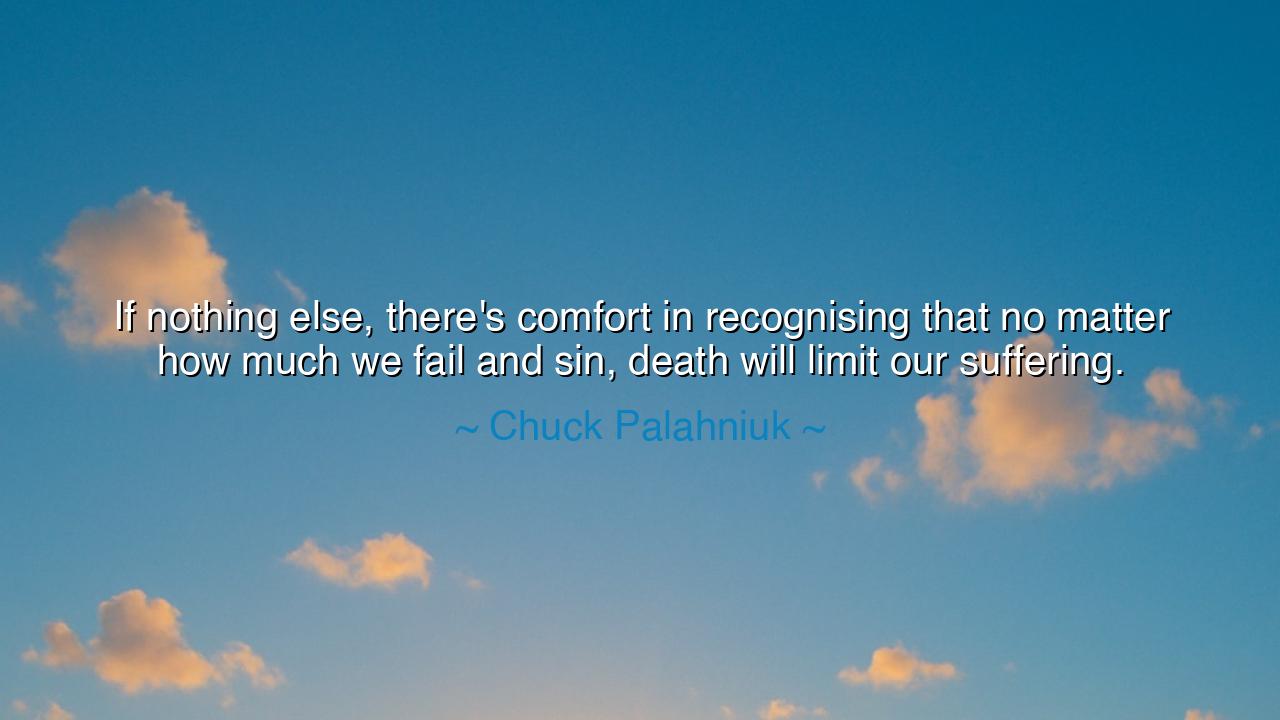
If nothing else, there's comfort in recognising that no matter
If nothing else, there's comfort in recognising that no matter how much we fail and sin, death will limit our suffering.






When Chuck Palahniuk wrote, “If nothing else, there’s comfort in recognising that no matter how much we fail and sin, death will limit our suffering,” he spoke not with despair, but with a grim and liberating truth. His words are an echo of the ancient philosophers, who saw in death not merely an end, but a boundary—a sacred line that suffering cannot cross. Life, Palahniuk reminds us, is a landscape of failure, pain, and imperfection, yet even in this chaos, there is mercy. For no matter how deep our wounds, no matter how endless our guilt may seem, there is a moment when it all ceases—when Nature, in her quiet wisdom, closes the book and says, “Enough.” To the weary soul, this is not a curse, but a kind of comfort, a whisper of balance woven into the fabric of existence.
Palahniuk, a writer known for exploring the dark corners of human nature, is no stranger to the themes of decay and redemption. His works, such as Fight Club and Choke, peel back the mask of civilization to reveal the raw desires and disappointments beneath. In this quote, he does not glorify death, but accepts it as the great equalizer—the one event that humbles kings and redeems sinners alike. He writes from the viewpoint of a man who has seen people break under the weight of their own humanity. He offers this truth as a kind of medicine for despair: that even if we cannot conquer our demons, they cannot haunt us forever. Death, the ultimate silence, sets a limit upon the suffering that life imposes.
The ancients, too, pondered this idea. The Stoics of Greece and Rome—men like Seneca and Marcus Aurelius—spoke of death not as tragedy, but as release. Seneca wrote, “It is not death that a man should fear, but never beginning to live.” To them, death was the end of fear and pain, a natural rest after the labor of life. Palahniuk’s modern echo of this philosophy reveals a similar understanding: that even when we fall, when we err, when we sin, we remain part of a greater cycle that will one day bring us peace. There is relief in that inevitability, for it means that no pain, however sharp, lasts forever.
Consider the story of Fyodor Dostoevsky, the Russian writer who once faced execution for rebellion against the Tsar. As he stood before the firing squad, waiting for the guns to sound, he experienced in those moments the unbearable closeness of death—and the paradoxical clarity that comes with it. His sentence was commuted at the last second, but that brush with the end transformed him. He wrote later that facing death had cured him of all fear, that life appeared to him with new vividness. He had learned, as Palahniuk later expressed, that death sets the boundary of suffering—and that the awareness of this limit can either terrify us or free us. Dostoevsky chose freedom, and from that freedom came his masterpieces of faith and forgiveness.
To see death as a comfort is not to long for it, but to understand it. It is to recognize that life’s torments—its guilt, failure, and sorrow—are temporary states, not eternal punishments. The despairing heart imagines that its pain is endless, that its mistakes echo forever. But Palahniuk reminds us that this is an illusion. All that rises must fall; all storms pass; all agony burns itself out in time. Death, impartial and absolute, draws a line that even the darkest suffering cannot cross. In that sense, death is not the destroyer of life’s meaning—it is its completion, the point at which the soul can finally rest.
Yet the true power of this thought lies not in resignation, but in acceptance. Once we understand that death limits our suffering, we can live more fearlessly. What remains to be afraid of, when the worst that can happen is already fated to end? Knowing that time is finite makes us more compassionate, more daring, more alive. We may still fail and sin, as Palahniuk admits, but we need not be paralyzed by guilt or fear. Instead, we can rise again, knowing that our struggles are part of the human story, bounded and redeemed by mortality itself.
So, children of the mortal dawn, take this teaching to heart: do not despair when life wounds you, and do not curse yourself for your imperfections. Suffering is not eternal; it is the shadow that proves the presence of light. Death, far from being the enemy, is the silent guardian that ensures our pain cannot reign forever. Live, therefore, with courage. Embrace your frailty, for it makes you human. Seek forgiveness, not perfection. And when you falter, remember the quiet mercy at the heart of existence—that whatever your sins, whatever your sorrows, Nature will not let them last forever. In the end, you will rest, and in that rest, you will find peace.






AAdministratorAdministrator
Welcome, honored guests. Please leave a comment, we will respond soon